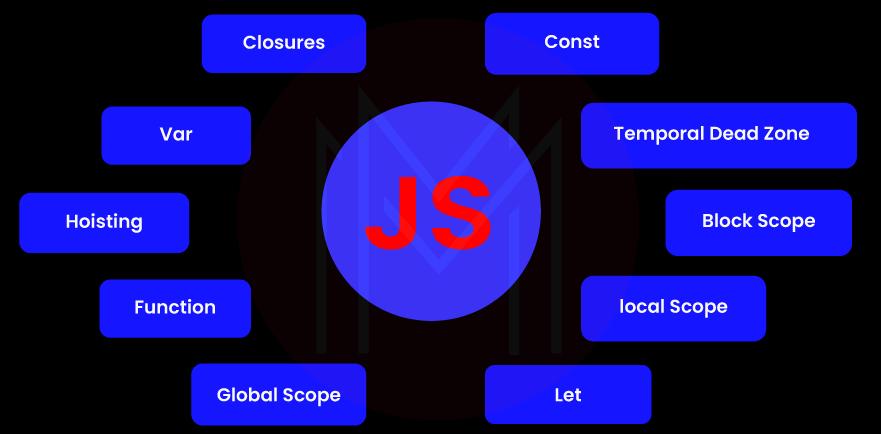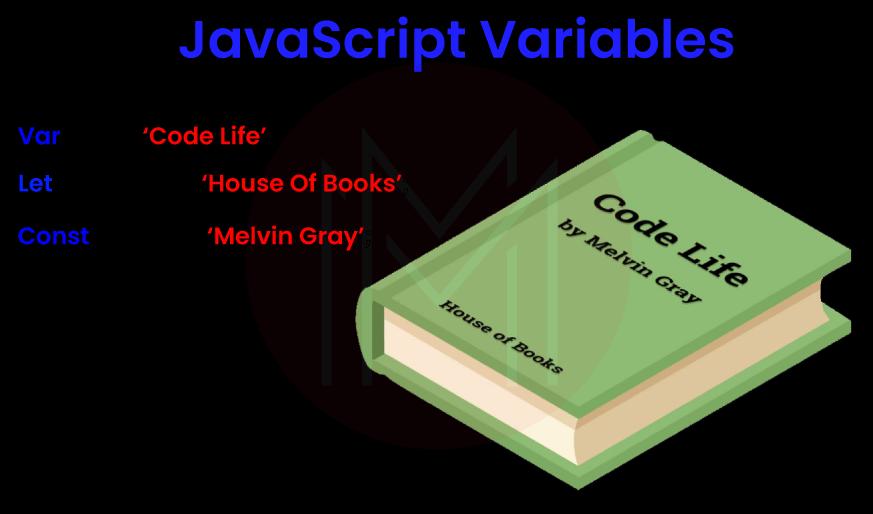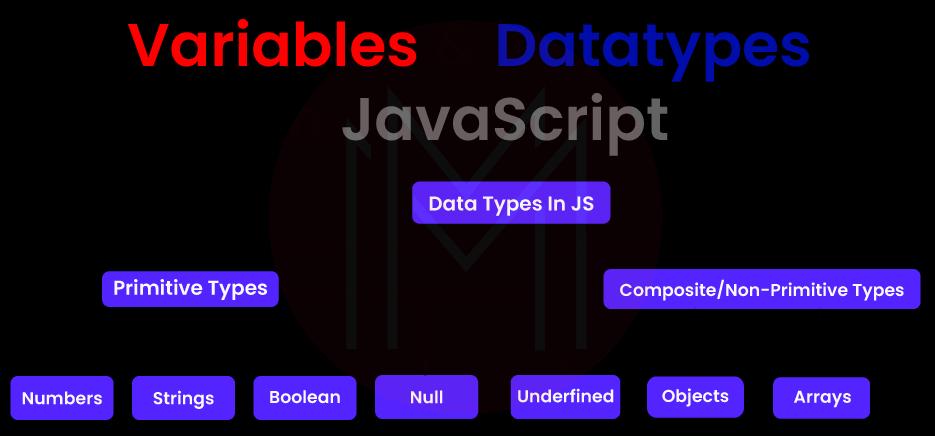- Home
- Blog
- JavaScript
- Types of JavaScript Variables

- JavaScript Frameworks
- JavaScript Interview Questions
- JavaScript Interview Questions For 2 - 5 Years Experienced
- Ember.JS Interview Questions
- JUnit Interview Questions
- TypeScript Interview Questions
- Vue.js Interview Questions and Answers
- JSON Interview Questions
- React Native Interview Questions
- TCS Interview Questions
- TypeScript Projects and Use Cases
- How To Become a Front End Developer?
- How to Install JavaScript on Windows?
There are several JavaScript frameworks and libraries. Javascript Libraries like React.js, JQuery, Express, etc., have been in great demand. AngularJs, Bootstrap, and Node.js are the perfect examples of Javascript frameworks.
Here, this article will discuss the types of JavaScript variables, how to declare them, and the rules we have to follow while naming a variable.

| Table of Contents: Types of JavaScript Variables |
What is JavaScript?
JavaScript(JS) is a widely used scripting language. It is an object-oriented dynamic programming language for computers. It is often used as a major component of websites, whose implementations enable the client-side script to communicate with users and create dynamic pages. The live script was the original name of JS.
JavaScript by Netscape may be in response to the buzz that Java was causing. The language’s general purpose is integrated into web browsers such as Netscape, Mozilla, and Internet Explorer. Client-side JavaScript mechanisms have many advantages over traditional server-side CGI scripts. When the user submits the form, the javascript code is executed, and he is submitted to the web server only if all the inputs are valid.
| Are you looking forward to becoming a JavaScript Developer? Check out the JavaScript Training and get certified. |
Advantages of JavaScript
- JavaScript is a versatile language easily used in web development.
- It is known for its quick performance and smooth user experience.
- It offers a great way to interact with the user and control the page flow.
- It also has an extensive ecosystem of libraries and tools that make development easier.
- JavaScript is also known for its easy learning curve, making it a great choice for beginners.
- It can run in any browser, i.e., it works platform independently
- It can easily respond on the web page when the user tries to perform an action
- It allows the user to get the output without using the compiler.
Disadvantages of JavaScript
- Large apps may be challenging to create, even though the user will also use the TypeScript layer.
- The bigger front-end projects fall under this. Due to the number of tools configured to provide an environment for such a project, the configuration is frequently tedious. This is frequently closely related to how the library runs.
- The biggest issue or drawback with JavaScript is that anyone may examine the code because it is always visible.
- No matter how quickly JavaScript is interpreted, JavaScript’s DOM (Document Object Model) is always sluggish and incapable of producing HTML quickly.
- The entire website may stop rendering if a JavaScript bug occurs. Browsers quite well handle JavaScript mistakes.
Why is JavaScript preferable?
- JavaScript is an interpreted language, hence there is no requirement for a compiler to do compilations.
- JavaScript was only used to create client-side applications, but as its frameworks, Node.js and Express.js, have developed, it is now frequently used to create server-side applications.
- Because JavaScript is commonly used in both client-side and server-side applications, it enables us to create a complete solution to a particular issue.
- JavaScript has a large community of mentors and users who prefer the language and take its legacy forward.
| Related Article: JavaScript Frameworks |
JavaScript Variables
When learning or practicing JS or any programming language, it is important to be aware of variables. Variables are nothing other than storage bottles of values. It is exactly similar to the variable we use in mathematics for calculation, theorem proof, etc. The value of the data stored in variables can be easily used at any number of times while coding. The value is variable until the program is being executed. So variables are names of storage spaces where a value is stored. Every variable name inside a single program should be unique.
Example
x=5;Here, x is a variable where the value 5 is stored.

Declaring variable
Every variable must be declared before using it or assigning any value. Declaring a variable is just putting a keyword before the variable name.
Keywords can be defined simply as a word predefined in the programming language. It has its significance and cannot be used as a variable name. It has a special meaning and a function.
There are three types of keywords for a variable declaration in JS: var, let, and const.
Example
var x;
const y;
let z; - Var - It is an outdated keyword in Javascript. We cannot declare a variable without var in older browsers. The variable declared using var can store variable values during the program's execution and can be redeclared anytime.
- Const - It is a keyword used to declare constant variables whose value cannot be changed throughout the program.
- Let - It is a newer keyword for declaring variables whose values can be changed. In this, a variable cannot be declared multiple times; however, they are declared once in a program.
| Related Blog: Java stream interview questions |
Things To Remember While Naming A Variable
- Variable names should be short and easy to remember.
- They should be descriptive enough to tell you what the variable represents.
- They should not be too generic or too specific to avoid confusion.
- They should not include any special characters like $, %, or @, except underscore.
- They should not contain spaces.
- They should not start with a number.
- Start a variable name with a letter or underscore(_).
- Javascript variables are case-sensitive, i.e., x is not equal to X.
- They should be unique and not used by other variables in the code.
- They could either be camel-cased or lowercase.
- They should not start with a capital letter.

Types Of JavaScript Variables
JavaScript variables are majorly of two types
1. Local variable
These variables are those declared inside a function.
Example
function print()
{
var age = 2;
console.log(age)
}
print();It can only be used in another function only by passing parameters.
Example
function print()
{
var age = 2;
return(age)
}
function print2()
{
var name = “Cijin”
var years old;
yearsOld = print();
}You can use the same variable in two different functions.
Example
function print()
{
var age = 2;
console.log(age)
}
print();
function print2()
{
var age = 4;
console.log(age)
}
print2();Local variables are a great way to keep your code concise and easy to understand. They allow you to bind specific values within a block of code, which makes it easier to track changes and troubleshoot issues. Additionally, they offer the flexibility of accessing these values from within any function that calls that block of code.
2. Global variable
Global variables are those variables declared globally or outside function declaration. They can be used in any function without passing any parameters to the function.
Example
var age=2;
function print()
{
console.log(age+1)
}
function print2()
{
console.log(age+3)
}
function print3(){
console.log(age+6)
}
print();
print2();
print3();Global variables are a powerful tool that allows you to store data in one place and access it from anywhere in your code. This is helpful when you need to keep track of multiple pieces of information or when you want to share data between various parts of your application.
| To Get answers to your JavaScript Questions, Read here "JavaScript Interview Questions" |
Conclusion
Generally, people start with Html, and CSS always goes in line with JavaScript since it enhances their skills in Html and CSS. What is certain about JS is that some JavaScript framework exists for software development services. JavaScript makes the webpage responsive, and it helps in attracting more and more users. JavaScript is likely to retain its position as the most used language. Statistics and facts say a lot about its bright future. JavaScript is used in the Full stack development domain, one of the leading domains in the technological industries, and provides job opportunities. Explore it maximum.
 On-Job Support Service
On-Job Support Service
Online Work Support for your on-job roles.

Our work-support plans provide precise options as per your project tasks. Whether you are a newbie or an experienced professional seeking assistance in completing project tasks, we are here with the following plans to meet your custom needs:
- Pay Per Hour
- Pay Per Week
- Monthly
| Name | Dates | |
|---|---|---|
| Core Java Training | Feb 21 to Mar 08 | View Details |
| Core Java Training | Feb 24 to Mar 11 | View Details |
| Core Java Training | Feb 28 to Mar 15 | View Details |
| Core Java Training | Mar 03 to Mar 18 | View Details |

Madhuri is a Senior Content Creator at MindMajix. She has written about a range of different topics on various technologies, which include, Splunk, Tensorflow, Selenium, and CEH. She spends most of her time researching on technology, and startups. Connect with her via LinkedIn and Twitter .















